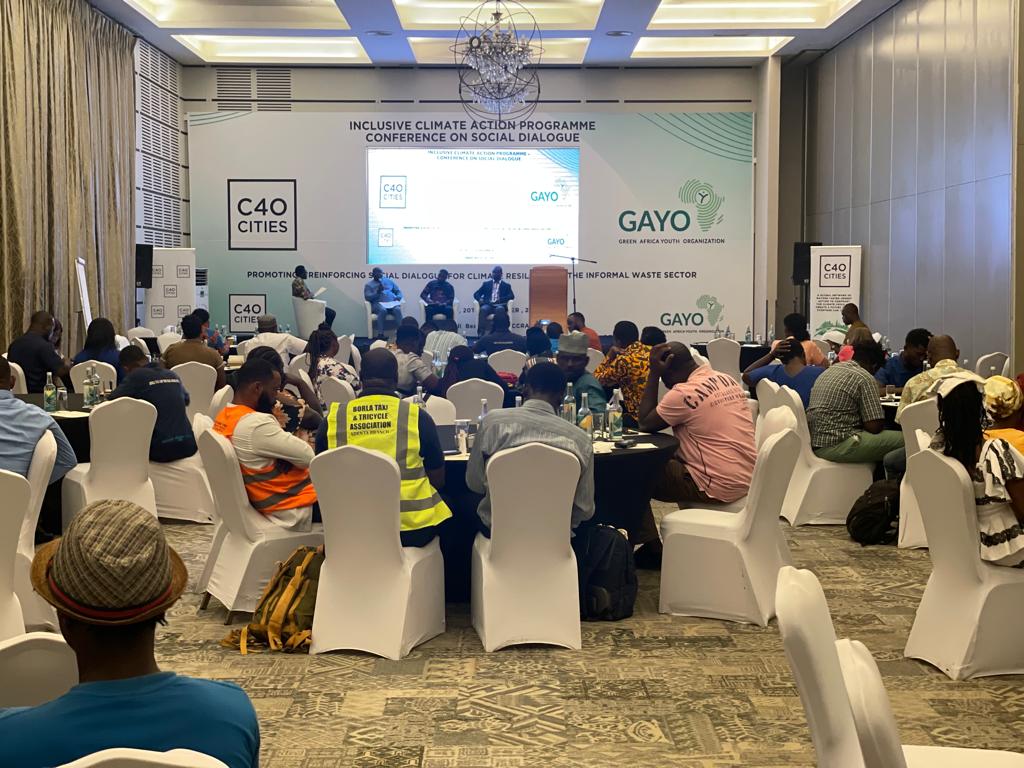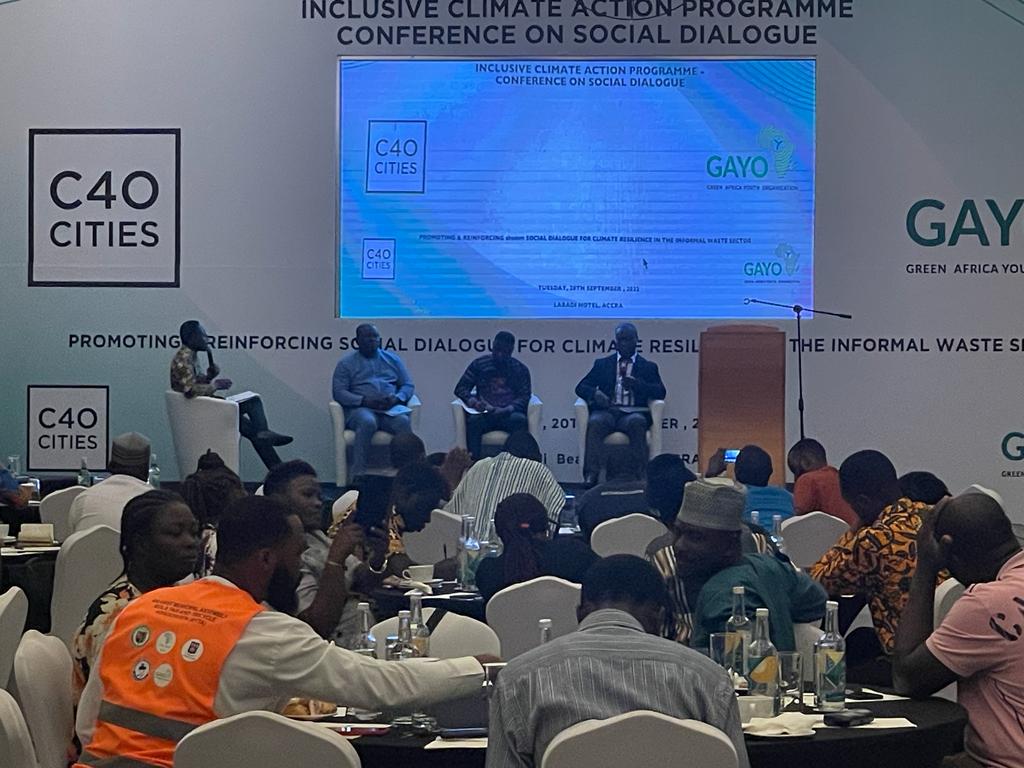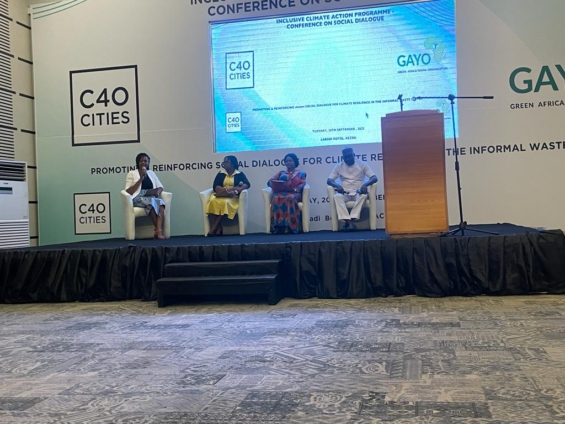On Tuesday, September 20th 2022, C40 Cities and Green Africa Youth Organisation collaborated to deliver a conference on the theme ‘Promoting and Reinforcing Social Dialogue for Climate Resilience in the Informal Waste Sector’.
The conference aimed to strengthen the capacity of city stakeholders and informal waste workers for in social dialogue.
The conference was attended by key sanitation and informal labour stakeholders including technical and political officials of the Accra Metropolitan Assembly, leaders of the Union of Informal Workers Association (UNIWA), an arm of the Trades Union Congress, and leaders of informal waste sector associations.
Also in attendance were officials from La Dade Kotopon and Ledzokuku Municipal Assemblies, researchers and members of civil society including People’s Dialogue on Human Settlements, Ghana National Plastics Action Partnership (GNPAP), and Footprints Africa.
Social dialogue is defined by the International Labour Organisation as all types of “negotiation and consultation between representatives of governments, employers and workers, on issues of common interest relating to economic and social policy”.

It is a critical constituent for ensuring decent working conditions for workers including informal workers. Currently, there is a need for more dedicated and sustained support to improve social dialogue between the Accra Metropolitan Assembly and informal waste actors for the city’s waste optimisation needs and climate resilience outcomes.
In her opening address, C40’s Cities Inclusive Climate Action City Advisor for Accra, Ms Josephine Agbeko, noted the role of social dialogue in stimulating trust and collaboration. She foregrounded that it is the foundation of building a workforce that can work in alignment with city and national development objectives.
In his keynote address, the Director of Research and Policy of the TUC, Dr Kwabena Nyarko bemoaned the precarious state of employment of informal waste sector workers. He noted that they work prolonged hours under unsafe conditions, face exploitation, have no social security, and are often underrepresented in waste management consultations in the city.
He emphasised the enormous contribution of informal waste workers in the city, noting their role in community sanitation, improving recycling, and ensuring that informal settlements and hard-to-reach communities receive needed waste management services.
He implored stakeholders, particularly the Accra Metropolitan Assembly and the relevant government agencies to institutionalise social dialogue with informal waste workers.

He stressed that social dialogue presents an opportunity to address challenges of informal waste service delivery such as those related to wages and fees, contracts and concessions, health care and social protection for informal waste workers.
In a welcome address delivered on her behalf, the Mayor of Accra, Elizabeth Sackey, stated that the informal waste sector is instrumental for improving community sanitation, reducing emissions, and helping to reduce the risks of disease community disease outbreaks.
She further stressed the city’s position in engaging with informal waste workers, saying: "We recognise that even far more work is required to ensure that we factor the needs, challenges and barriers faced by informal waste sector workers into our urban development planning, decision making and policy development".
She noted that addressing these challenges is only possible through engaging in strategic social dialogue with informal waste actors.
Ms Deborah Freeman, General Secretary of UNIWA, who was a panelist at the conference, lamented the absence of a strong informal waste sector trade union and the lack of a state commitment to the process as key challenges with delivering social dialogue. Informal waste sector workers were admonished to consolidate a trade union which can help to increasing their bargaining power, and strategic engagement for their "rights as persons".
Ms Elham Mumuni, advisor on Gender and non-discrimination at National Plastic Action Partnership (NPAP), noted that overlooking the informal waste sector is counterintuitive to the city’s waste management goals and stressed the value of social dialogue to providing decent work opportunities for informal waste workers.
Technical and political officials from the waste management and planning unit of the Accra Metropolitan Assembly underscored the city’s commitment to innovation in continuous engagement with informal sector workers.
They also stressed the need for accountability led by a strong informal waste sector union. Officials have made commitments to expand the the level of town hall meetings to engage with and address issues pertaining to informal waste sector labour.
Following this conference, C40 Cities will continue to work the AMA and civil society to improve participation and dialogue opportunities for informal waste workers.
This conference was delivered as part of C40’s Inclusive Climate Action pilot programme in Accra. Accra is 1 of 9 cities participating in C40’s Inclusive Climate Action programme. The programme aims to provide cities with a clear roadmap and support to plan, build consensus and deliver bold climate action that is equitable and beneficial for all.
Informal waste workers in Accra include borla taxi and tricycle operators, community plastic and metal waste pickers, landfill waste pickers, informal waste processors and recyclers. 30% of informal labour in the city can be found in the city’s waste management value chain.
Latest Stories
-
Joy FM Prayer Summit for Peace ends in electrifying worship and prayer
7 hours -
The Conscience of Leadership: A call to President Akufo-Addo on Ghana’s environmental devastation
8 hours -
Ghanaian youth unaware of their right to hold politicians accountable – Youth Bridge Foundation
9 hours -
Judge delays Trump sentencing for a third time
9 hours -
2024 WAFCON: Ghana drawn against defending champions South Africa in Group C
9 hours -
Photos from DW-JoyNews street debate on ‘galamsey’
10 hours -
Mimmy Yeboah: Blending heritage with global sophistication, confidence redefined through couture
10 hours -
100 Most Influential People Awards 2024: Brain Hill International School’s Director Mary Anane Awuku honoured
11 hours -
Akufo-Addo commissions 97-km Tema-Mpakadan railway line
11 hours -
Majority requests recall of Parliament
11 hours -
Kanzlsperger and Professor Quartey support WAFA with medical Donation
11 hours -
Gideon Boako donates 10 industrial sewing machines to Yamfo Technical Institute
11 hours -
‘Golden Boy’ Abdul Karim Razak honored at WAFU-B general assembly
12 hours -
Buipewura Jinapor secures Vice Presidential position in National House of Chiefs with record votes
12 hours -
2024 election: I want results to come out like ‘milk and honey’ – Toobu
12 hours

